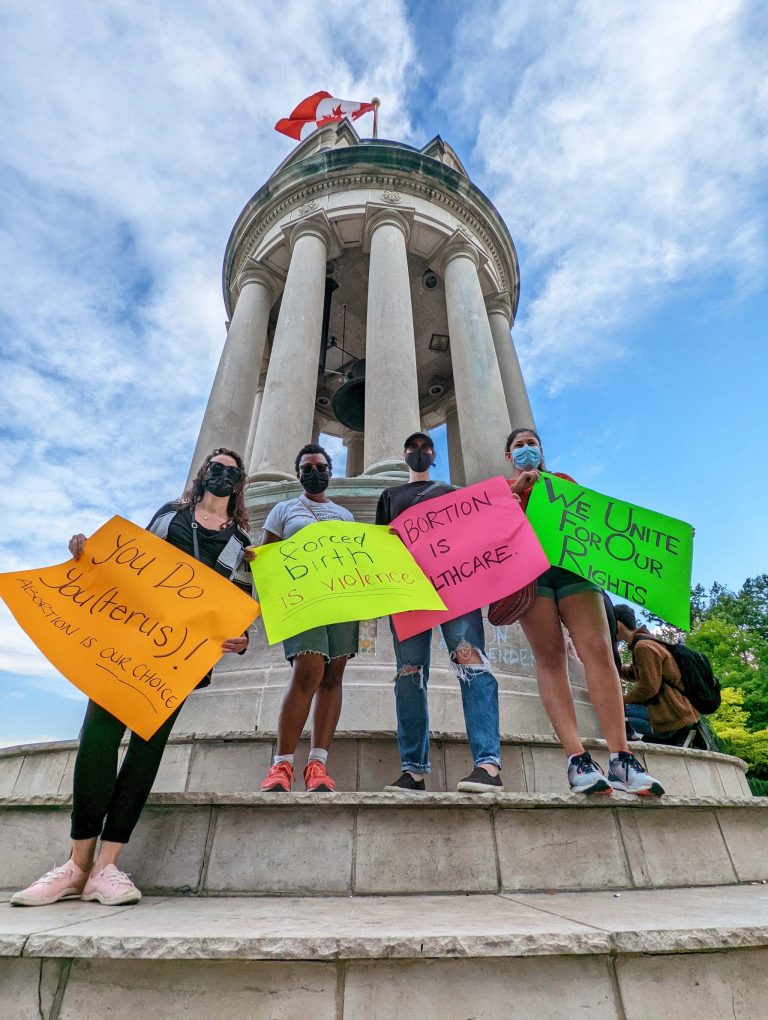The Supreme Court of the United States overturned Roe v. Wade on June 24, removing the constitutional right to abortion in the U.S. Although there is limited direct impact of American laws on Canada and vice versa, pro-choice rallies have taken place across both countries since the decision was finalized.
The SHORE Centre hosted a Pro-Abortion Rally on June 29 at the Clock Tower in Willow River Park, formerly Victoria Park. Hundreds of people gathered to hear speeches and show their support for the right to access abortion.
“Abortion is a key part of bodily autonomy, as well as a healthcare right. And so, I think it’s important for folks to remember that we’re talking about all of those aspects of reproductive rights,” TK Pritchard, executive director at the SHORE Centre, said.
The rally was organized to show solidarity with peers in the U.S. and highlight barriers to access to abortion in Canada.
“We’re compelling the federal government to enforce the Canada Health Act, which ensures equitable access to insurance services across the province, as well as the provincial government to invest in abortion and reproductive health care across the province and our regional government as well to compel those levels to take action and for them to work with SHORE center to ensure that we can better serve the community,” Pritchard said.
Speakers included Laura Mae Lindo, Maddie Resmer, TK Pritchard, Kendra Weerheim and Ruth Cameron. The rally ended with a performance by Alyssa Brilla and Madie Resmer.
Lindo started off the rally with the repeated chant, “Abortion is healthcare!” Lindo said there is no need to justify pro-choice and pro-abortion rallies as they are about healthcare and mentioned the disproportionate impact of limiting reproductive choices on BIPOC people.
“[If] abortion is healthcare, there’s also a notion of me being allowed to make healthy choices for myself. When we have fights to invest in healthcare, we also have to have real discussions about investing in reproductive health,” she said.
Resmer reiterated that BIPOC people historically lacked autonomy and agency over their bodies.
“When we speak about minority bodies, we are speaking about them in the sense that they are not our own and have never been our own. Our bodies belong to the state. Our bodies belong to men. Our bodies belong to religion. Our bodies belong to everyone except us,” they said. “We’re speaking of our bodies as battlefields. We weren’t born into this world without the choice of what we can and can’t do with our bodies because they do not belong to us.”






In Canada, abortion is considered a healthcare service more so than a political or legal issue. Pritchard said the conversation around abortion is different in Canada and is much more subtle. Although voters should be aware of political figures’ opinions and work on specific issues like abortion, it is also important that such services remain in the purview of healthcare.
“[As] soon as it’s put into law, it takes [the issues] out of the healthcare sphere and into the political sphere. And then what politicians do is bring those types of amendments and changes and it’s, you know, you’re more likely to see what’s happening in the US,” they said.
Abortions have existed for as long as people have inhabited this continent. Resmer started their speech by listing some plants historically used to perform abortions including Queen Anne’s lace, blue cohosh, wormwood, corn mint and yarrow.
However, accessing abortions continues to be filled with challenges. Along with the stigma, there are financial and practical challenges to accessing abortion. Even in major urban centers, providers are limited.
“Commonly, folks think that it is easy to access here because it’s decriminalized, but the reality is there are a ton of barriers to accessing abortion, whether those are geographical barriers, other systemic issues such as racism within the healthcare system, a lack of queer specific care, you know, financial barriers, lack of insurance—like all of those things make accessing abortion within the country really difficult,” Pritchard said.
There are rallies planned across the country, including one in Guelph. For more information, visit www.shorecentre.ca.

